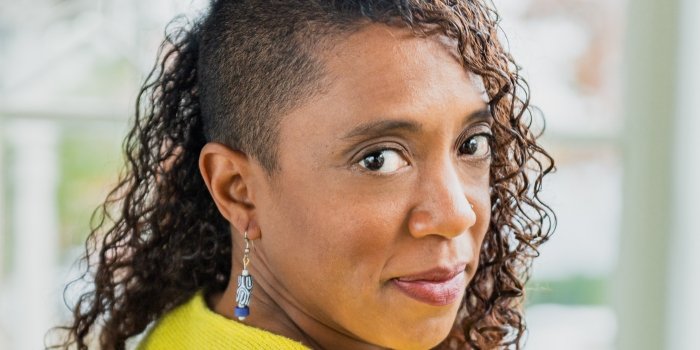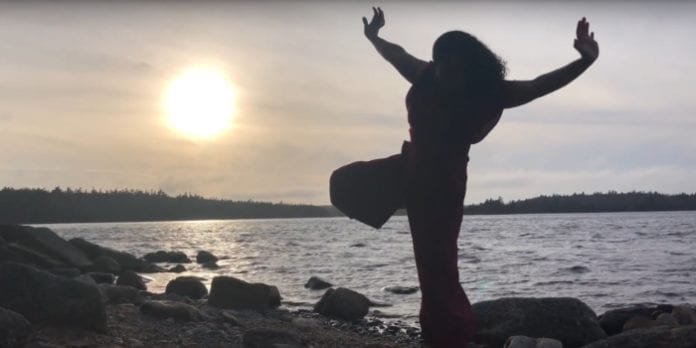Halifax dance artist Liliona Quarmyne will join over a dozen other Black artists from across Canada in the digital film short Tessel from award-winning Toronto-based choreographer and dancemaker Esie Mensah.
Premiering on the first anniversary of Blackout Tuesday, a day when organizations worldwide publicly committed to institutional change in support of the Black community, the film aims to amplify Black voices.
Last June, individuals and artists from around the globe – including my team at Fall for Dance North, our co-commissioners Harbourfront Centre, and so many of my colleagues – made a promise to be better allies. To use our position and our privilege to support the Black artistic community. This project represents one such action, as we use our resources and energies to showcase Black excellence in Canadian dance and support the work of Esie, a creator we esteem greatly.” – Ilter Ibrahimof, artistic director, Fall for Dance North.
“Tessel is short for the word tessellation which is a simplification of a pattern,” explains Mensah by email. “The conversation about race and change is not new, and many people feel that we exist in a habitual pattern. One that has taken too much work to change. This film was about offering a truth within this age-old conversation through a simplified lens.”
Describing 2020 as a year of exhaustion, frustration, weariness and rage, Mensah says in a media release that “it was a year where we were all forced to watch and absorb how horrific the circumstances have been and continue to be.”
Compelled to take action and challenge the global discourse on race, Mensah wanted to not only look at the traumas that have marked the history of the Black community but highlight the victories as well.
“There is an honesty that is needed to push conversations into action,” continues Mensah. “It is my hope that the film will be a catalyst, sparking further conversation and opening minds and hearts towards empathy and understanding.”
For Halifax-based Liliona Quarmyne, it also became an opportunity to connect with other Black artists.
“As a Black dance artist on the East Coast, I’m sometimes disconnected from what is happening across the rest of the country,” she says. “So it was just really exciting to get the invitation to participate.”

Sparked by conversations Mensah had with each dancer around their relationships to ritual, rage, exhaustion, self-care, rest, and futurism, each dancer contributed independently. The final product came together through editing, with their footage overlapping and flowing together.
“Esie gave us beautifully open prompts, inviting us to move and to share movements that came from where we are in our practices and processes right now,” explains Quarmyne. “The footage was being woven together, edited, adapted into more of a cohesive narrative.”
But while the conversations lay the groundwork for each dancer, Quarmyne says they were given a free hand in creating the individual works. As a result, her work focuses on land, water and connections to her Ghanaian and Filipino heritage.
“When I am on the coast in Halifax, I am very often aware that on the other side of the ocean is Ghana,” she explains. “But where the ocean off the coast of Ghana is wild and tumultuous and very dangerous, the ocean off the Halifax coast is gentler. So when I am moving, especially near water, those are the things that I am carrying in my body.”
Filmed at Nova Scotia’s Long Lake, with assistance from fellow artist and friend Mo Phung, Quarmyne explores stories that she says have crossed oceans.
“I don’t have ancestors who were part of the transatlantic slave trade, but I do have ancestors who were part of the internal slave trade in what has now become Ghana. All those stories are very alive in me when I move on the land and the water.”
Describing Tessel as revolutionary in connecting Black dance artists from across the country, Quarmyne is grateful for the opportunity it has provided.
“It’s quite a gift, especially in the middle of a time when so much has been asked of so many in the current time but of Black artists specifically,” she says.
Co-commissioned by Toronto’s Fall for Dance North and Harbourfront Centre, Tessel is co-presented by partners across Canada, including Halifax’s Live Art Dance.
Tessel premieres on June 1 and will be available to stream for free online at tessel.film.


